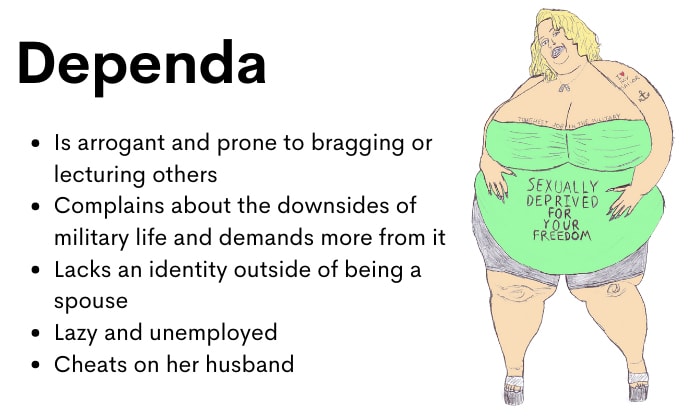What is a dependa in the military? Dependa, or dependapotamus, is a negative stereotype of a woman who is married to a military man.
It evokes the image of a person who is fat, lazy, and contributes nothing to the household. The term refers to someone who is purely after the financial and rank benefits of her spouse yet also demands more and doesn’t feel grateful for what she has.
Although internet-coined terms for “male dependa” exist (such as “dependabros”), “dependa” largely refers to women. We’ll discuss more about this contentious slang below.
Table of Contents
Who Are Military Dependa?
As stated, dependa meaning refers to a woman who is a military spouse. She is thought to be entitled and demanding, and thinks she deserves special treatment because of her husband’s job. His privileges are hers, no matter how unearned.
Historically, the origin of “dependa” is unclear, but it already existed in military argot during the 1990s.
Dependa, or its longer version, dependapotamus, seems to take inspiration from the term “hippopotamus,” which is where the image of a fat military spouse came from.
It is one of the well-known military wife nicknames, and Internet trolls often use this slur indiscriminately to shame women online for no reason other than their status as military spouses.
Aside from the negative portrayal of dependas as useless gold diggers, this term may also describe a military wife who:
- Cheats on her husband
- Is arrogant and prone to bragging or lecturing others
- Complains about the downsides of military life and demands more from it
- Lacks an identity outside of being a spouse
- Lazy and unemployed
As you may have noticed, material dependency or ‘doing nothing’ seems integral to the concept of a dependa.
However, some argued that bullies actually use this pejorative to belittle women who dare talk about their life problems, and it’s the ‘temerity’ to complain that users take offense with, not the financial reliance.
After all, “dependa” is a newer term, while military wives have benefited from their husbands’ incomes for much longer stretches of history.
In military families, it’s also common for female spouses to have jobs or actively search for employment, so “gold digger” often doesn’t ring true as an insult.
Life as a Military Spouse
There are many negative stereotypes of military spouses, some quite similar to the stereotypes attributed to dependas, such as them being unemployed and wealthy due to their spouses’ incomes.
Other assumptions are “military spouses are uneducated” and that they are always having babies—both of which are untrue.
If we look at statistics, over 50% of military spouses work, and 89% of them have some degree of college education. The average military family also has two children, which is quite average, in my opinion.
And just like anyone else, military spouses have their own sets of problems.
- First, they’re often the only ones responsible for child care and child-rearing, since their partners may be deployed for months on end.
- The families also relocate every two to three years, so keeping a stable job is difficult.
Spouses may move to a place where it’s hard to find a career in their field, or employers would be unwilling to offer high salaries due to frequent job changes and resume gaps.
- Relocation also makes finding friends and maintaining close relationships challenging. Being away from your spouse can put emotional strain on the marriage, and loneliness, resentment, and even depression are borne from such circumstances.
Conclusion
What is a dependa in the military? Now that you know its meaning, it’s obvious why a woman would not appreciate being referred to in such a way.
Regardless of what term one uses, it’s good to strive for constructive criticism or humor and not cruelty or bullying.

For an ex-serviceman, it is a pleasure for me to continue my work in The Soldiers Project. This site is built with the target to help people who work in security jobs and other people to gear themselves with high-quality equipment. It is essential for many duties that they have the protection required to perform with safety.


